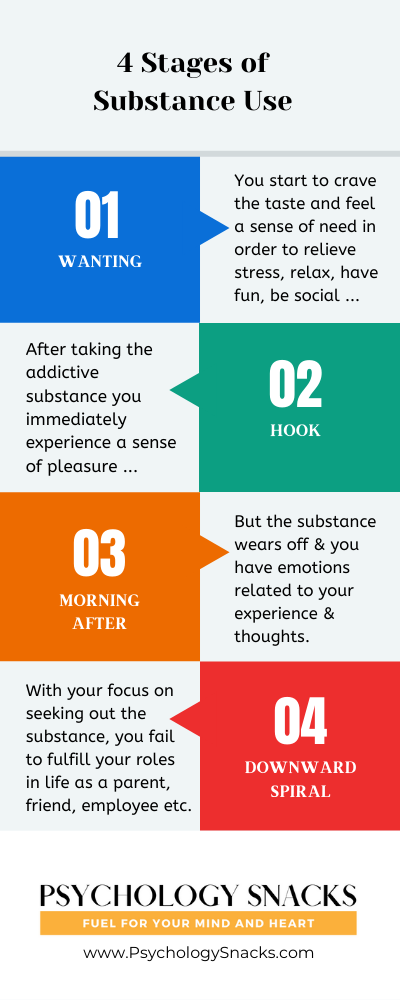
To determine if a person is addicted to alcohol or drugs, a psychologist will assess behaviour against criteria for the specific substance of use. The American Psychiatric Association used to make a distinction between dependence and addiction. However, the current diagnostic manual (DSM-5) no longer makes this distinction and instead defines use disorders on a spectrum of mild, moderate and severe.
If you’re finding yourself wondering “Am I addicted?” … here are the 4 general stages of substance use disorder (addiction).
Stage 1: The Wanting. Oh, the wanting.
You can taste the frothy hops of a cold beer hours before it’s poured. You can feel the stress relief a glass of chardy will bring as you laugh and say “Mama, needs her wine”. That is the sense of wanting taking hold. But does this desire mean you’re an addict?
What causes a person to desire a substance is not the drug itself, but the neural circuitry that fires at the thought of what that substance will do for you (stress relief, dissociation from reality, carefree joy and laughter). It’s the same for addictive behaviours such as gambling, sex, control and lying.
Stage 2: The Hook.
After taking the addictive substance you immediately experience a sense of pleasure. This immediate response is both psychological (a part of your identity) as well as biological (see “What makes a drug addictive?”). The hook is what gets you addicted. You think you’re gregarious and fun when you drink and you’ll be boring if you don’t. If you look around at your friends, are they all (borderline) addicts too?
Stage 3: The Morning After.
When the addictive drug wears off, early users may feel a sense of euphoria when reflecting on their experience. Sharing stories in the morning after, with friends who were there, enhances bonding and reinforces a sense of belonging in the group.
Veteran users might begin to experience an array of negative emotions like regret, shame, guilt, anxiety, depression and self-directed anger for not being able to stop. Like a comfort shag[1] with an ex-boyfriend, it seems like a good idea at first but eventually you start thinking it really is time to move on … I’m done for real this time I swear …
Stage 4: The Downward Spiral.
You experience a downward life spiral till you find your personal rock bottom. You’re so consumed with seeking out and taking the addictive substance that you fail to fulfill your roles in life as a parent, friend, sibling, employee etc. To be diagnosed with substance abuse disorder (addiction), the critical element a Psychologist will look for is signs of impairment to your daily life.
It is at stage 4 that many people self-assess that they’re not addicted …
I’ve often heard people jokingly refer to themselves as a “high functioning addict” (meaning they meet the criteria for stages 1 to 3 but not 4). Some people feel proud that they always show up to work despite a mega hangover. They promote this accomplishment like it’s a badge of honour (I certainly used to).
Most of us think hitting bottom means living on the streets, stealing and giving BJs for your next hit.
But what if it was about recognizing that masking anxiety with substance abuse is dulling your sense of self? Or that being irritable and agitated is no longer how you want to feel? Or that your family’s cycle of addiction will stop with you?
Rocks protect the shore from waves, what type of rocks are you choosing to protect your life?
[1] “Shag” is an Aussie slang word for sex.
